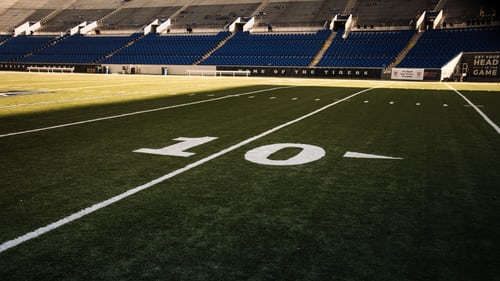The NFL Has Gotten Chummy With Sportsbooks
Heading into the 2021 NFL Regular Season, most fans have concentrated on whether or not the Green Bay Packers will trade Aaron Rodgers. Almost nobody is talking about the most significant development in the National Football League in the past decade.
The NFL and sports betting are buddies. In April this year, the National Football League created a tri-exclusive official football betting partnership.
The league’s acceptance of what up until 2018 had been a place for shady characters and gambling-addicted, jobless middle-aged males is not only a sign of the times but also a sign of how the league is desperate for new revenue streams.
Top 3 Reasons the NFL made the tri-exclusive deal
Money talks. It talks a lot in the National Football League.
Money is the main reason the league decided to partner with three, not one, but three different online sportsbooks. But money is the umbrella reason.
Check out five under the umbrella reasons the National Football League has accepted sports betting as a viable revenue stream.
NFL’s billion-dollar broadcast deals may go the way of the dodo bird
Up until this year, the NFL had relied exclusively on television deals. Those television deals don’t matter as much because the traditional broadcast model is ending.
Don’t get us wrong. The last broadcast and streaming rights deal the NFL signed is massive.
The deal is for $110 billion over 11 years. Sounds like a ton of money, and it is, but because it’s spread out over more than a decade, the deal won’t take into account inflation.
Also, who knows what mechanisms are in place for the networks and streaming services to change the deal?
Football is declining, which means the NFL must keep its one growing fan base happy
In a 2020 article, Forbes.com released an Aspen Institute and National Federation of State High School Associations study, which revealed that from 2008 through 20019, the total number of youths who played tackle football aged 6 to 18 declined by an incredible 620,000.
The total had been at 2.5 million. In 2019, less than 2 million high schoolers played football. The lack of football players should lead some colleges to shutter their football programs.
Teams like Alabama, USC, Georgia, and Ohio State will always have football. But other universities, including some from the Midwestern Athletic Conference, may decide playing football doesn’t make sense economically.
Not only that, but the NFL, although still popular, is not nearly as popular as it was in the past. Fans aren’t as rabid about their teams like they used to be, which means the league must protect the one fan base which will never go away, football fans who also bet on the NFL.
The league holds the best cards in the deck
The NFL stood to gain $1.75 to $2.3 billion in revenue as more states legalize sports betting. The league decided not to wait to see how much they will make, which is why the tri-exclusive deal is for five years for just under $1 billion.
Ah, but the deal allows the NFL to escape after just three years, which should be plenty of time to see if legalized sports betting in the NFL has legs.
There’s another reason the NFL decided to sign a 5-year deal with a 3-year opt-out clause. Betting on NFL doesn’t revolve around the three partners in the tri-exclusive deal.
By signing the deal now, the league pockets $1 billion for doing nothing. If legalized sports betting turns out to be more of a whimper than a bark, the NFL escapes after three years with close to $1 billion.
They can then create a single package deal as they did for the $100 billion from the networks and streaming services, hand out contracts to multiple sportsbook partners, or give up on sports betting.
NFL betting handicappers have options
Almost every state in the U.S. is on track to legalize some form of sports betting. But most betting on sports happens online, and this is where things get tricky.
California, the largest state with the most people, may never allow for online sports wagering. One of the issues? Tribes in the Golden State want a monopoly on sports betting.
Whether anyone agrees with the idea of a monopoly or not, as Dan Walters notes in his Cal Matters article, it is challenging to beat the tribes. The major Nevada corporations didn’t before.
They likely will not do it again. There is also an unspoken, glaring issue that gamblers, those who make legalized sports betting possible, have.
Professional gamblers can’t afford to pay taxes on their winnings. The average sports bettor wins 52.3% to 55% of their wagers at -110 bets.
State taxes vary from 5% to 20% on sports betting winnings. At 5%, the professional sports bettor is breaking even. At 20%, the sports bettor must win 70% of their wagers to break even.
Taxes are one reason online sportsbooks and local bookies will never go away. Pay per head, or PPH sportsbook operators, pay a fee to offer free betting software.
Often, bookie agents can provide better odds than online sportsbook corporations. The NFL knows this, which is why the league decided to go into the tri-exclusive deal earlier than later.
Although Wall Street is sold on legalized sports betting, check out DraftKings’ stock price, the NFL isn’t. The league figured it had better score on the sports betting wave while it could.

